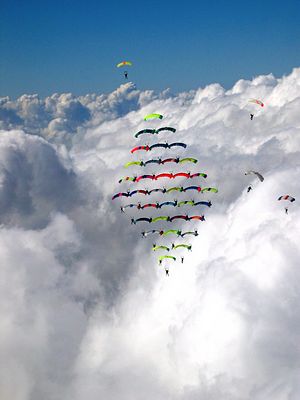FAI Skydiving Commission (ISC)
Canopy Formation
 In the early 1980’s, some skydivers began flying their new generation airfoil designed parachutes in formation with each other, often with one skydiver sitting on top of another’s canopy, using the legs or hands to stay attached. This practice quickly became popular with a number of adventurous skydivers, who worked to develop these skills into a recognised competition discipline.
In the early 1980’s, some skydivers began flying their new generation airfoil designed parachutes in formation with each other, often with one skydiver sitting on top of another’s canopy, using the legs or hands to stay attached. This practice quickly became popular with a number of adventurous skydivers, who worked to develop these skills into a recognised competition discipline.
The term Canopy Relative Work was used to describe this activity in its beginning and this was shortened to CRW (often pronounced Crew) which is still used by many today, although Canopy Formation is the official term. Today there are 3 events in the Canopy Formation Discipline:-
- 4 way Rotations
Teams of 4 skydivers, supported by a skydiving videographer, are allowed up to 30 seconds to build a 4 stack formation. Once the initial formation (worth 1 point) is built, the top jumper rotates to the bottom of the stack to score another point. As soon as the rotating jumper is linked onto the bottom of the stack, the next skydiver on top may commence a rotation to the bottom, thus scoring an additional point. The team has 1½ minutes to score points. The team with the most points wins. - 4 way Sequential
Teams of 4 skydivers, supported by a skydiving videographer, have 2 minutes from the time of exit to score points. A point is scored for each formation correctly completed in accordance with a draw made at the start of the event. The pool for the draw contains 14 separate sequences of two points and random formations worth 1 point each. For each competition jump there are either 4 or 5 different formations in the jump sequence, which is repeated during the jump to score as many points as possible. - 2 way Sequential
Teams of 2 skydivers, supported by a team videographer, have 1 minute of working time to complete a pre-determined series of formations. A point is scored for each formation correctly completed in accordance with a draw made at the start of the event. The pool for the draw contains 12 separate formations. For each competition jump there are 5 different formations and the team have to complete the series as many times as possible during the working time.
In each event, the team’s videographer delivers the tape to the judges for scoring immediately after landing. This video footage is used later for judge and team training, as well as media coverage of the sport.
Read the history of Canopy Formation

